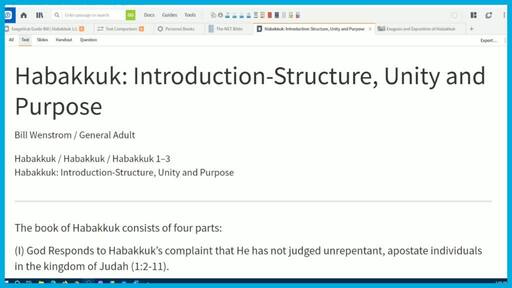Habakkuk: Introduction-Structure, Unity and Purpose

Habakkuk Introduction • Sermon • Submitted • 1:08:38
0 ratings
· 229 viewsHabakkuk: Introduction-Structure, Unity and Purpose
Files
Notes
Transcript
The book of Habakkuk consists of four parts:
(I) God Responds to Habakkuk’s complaint that He has not judged unrepentant, apostate individuals in the kingdom of Judah (1:2-11).
(A) Habakkuk complains to God about His failure to judge unrepentant, apostate individuals in the kingdom of Judah (1:2-4).
(B) God responds to this complaint by informing the prophet that He will send the Babylonians as His instruments to judge these unrepentant, apostate Judeans (1:5-11).
(II) God responds to Habakkuk’s complaint that He will use the Babylonians to judge his unrepentant, apostate countrymen (1:12-2:20).
(A) Habakkuk responds by questioning God’s choice of the Babylonians who he considers more wicked than these unrepentant, apostate Jews (1:12-17).
(B) Habakkuk waits for an answer from God (2:1) who responds by assuring Habakkuk that He will also judge the Babylonians for their unrepentant wicked behavior (2:2-20).
(III) The Lord gives the prophet a vision of Himself as the Divine Warrior (3:1-15).
(IV) Habakkuk confesses his confidence that the Lord will execute justice (3:16-19).
The unity of the book of Habakkuk has been challenged by liberal scholars who view Habakkuk chapter 3, which is a psalm, as postexilic, or in other words, after the southern kingdom of Judah’s return from their exile in Babylon for seventy years.
Furthermore, calling into question the unity of the book is that the commentary on Habakkuk which was found at Qumran does not contain chapter three.
Therefore, for these reasons, liberal scholarship rejects the unity of this book.
However, the failure of these scholars to provide any compelling reasons to reject chapter three argues for the book’s unity.
Furthermore, the continuity of theme extends throughout the book.
The purpose of the book of Habakkuk was two-fold.
First, the book was designed to provide assurance for the faithful remnant in the southern kingdom of Judah that their God was sovereign over the affairs of not only their nation but also other Gentile heathen nations including the Babylonian Empire.
Secondly, it was to reassure them that God would in His own time judge those in their nation who were unrepentantly disobedient to the Mosaic Law and that He would also judge unrepentant heathen nations.
This interpretation is indicated by the contents of the book.
In Habakkuk 1:2-4, Habakkuk complains to God about His failure to judge unrepentant, disobedient individuals in the kingdom of Judah.
Then, in Habakkuk 1:5-11, God responds to this complaint by informing the prophet that He will send the Babylonians as His instruments to judge these unrepentant Judeans.
Then, in Habakkuk 1:12-17, Habakkuk responds by questioning God’s choice of the Babylonians who he considers more wicked than these unrepentant Jews.
In Habakkuk 2:2-20, God responds to this complaint by assuring Habakkuk that He will also judge the Babylonians for their unrepentant wicked behavior.